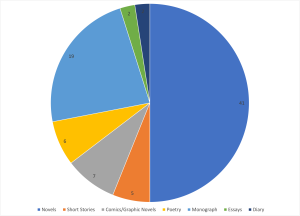I have been more delinquent than usual in getting these up. I will try to make up for it by doing two this week, one today and one at the weekend as “usual.” Some of the links here are not exactly new any more, but I hope you’ll all find them worth a look anyway.
Article: “Computer Love: Looking Back at Star Trek: The Next Generation on it 25th Anniversary” by Brian Phillips
The first thing that grabbed me about this piece was the author’s description of himself as someone who is not really into Star Trek as a whole, but likes The Next Generation. I also fall into that category; I can take or leave the original series, like most of the movies, got tired of Deep Space Nine as soon as it became centered on conflict, and have only seen a couple of episodes of Voyager. He also identifies clearly and persuasively what it is I like about the show, in the process of describing it as a product of its time. As Phillips points out, ST:TNG premiered just before the end of the Cold War, and much of its run can be seen as shaped by those real-world events. But this goes beyond the obvious claims for the possibility of unity despite diversity, which is surely there; more than anything else (for me anyway), the show is about human potential— what we can do, what we can be, at our best. I cannot think of another show in which every character spends his or her leisure time engaged in projects of self-improvement and enrichment: learning new instruments, painting, studying new fields, etc. Having just re-read Aristotle’s Politics again, I am struck by his assertion that “leisure is the end of work”; “leisure” here s not just free time, however, but precisely time spent in philosophical contemplation or some other edifying activity. It is not idleness; no one on ST:TNG is ever idle. There seems to be no equivalent of vegging out in front of the TV in this world. This is a society in which technology (not slaves, as in Aristotle’s vision) has given people a certain amount of distance from necessity, from material imperatives, but also in which they make the best possible use of their new found freedom. This probably strikes many people as profoundly unrealistic, and it also probably accounts for what some people see as the show’s didactic tone. But it is precisely what I have always liked about it. I cannot help but hold on to a fairly old-fashioned notion of human progress, in which many if not most problems are fundamentally solvable with creativity and sweat, provided we will stop tripping over our own feet. The Next Generation embodies for me that worldview, and thus I continue to love it despite its many evident flaws.
Article: “Unmasking Reddit’s Violentakrez, the Biggest Troll on the Web” by Adrian Chen
One the other end of the spectrum from my optimistic faith in humanity, a story about a guy who got (internet) famous for posting pictures of underage girls, people being beaten, and other disgusting crap. Essentially, a reporter at Gawker figured out the real identity of this person, and revealed it in this article. Anonymity, though, is one of Reddit’s foundational principles, and poking holes in that got a lot of people very upset. This story has already gotten a ton of attention, so I don’t know how much I have to add to the conversation, but in general the debate over whether this guy should have been outed has revolved around the question of the relationship between anonymity and free speech. Defenders of Violentakrez argue that, by publishing the most offensive, most unpleasant things, he effectively guaranteed that other, more reputable but potentially controversial things like unpopular political opinions can also be voiced without fear of reprisal or repression. In other words, if we censor anything at all, we open the door to censoring everything. In general, I am actually pretty sympathetic to that part of the argument; I have in the past described myself as a free speech absolutist, and I stand by that.
However, there are two other issues here. The first is that some images are problematic not in themselves, but because of the way they were produced. To take the extreme, and therefore easiest case, child pornography shouldn’t be seen as a free speech issue at all, because every such image is evidence of a crime. If you are looking at images of children involved in sexual acts, then somewhere a child has been sexually assaulted. As far as I am aware, nothing posted by Violentakrez quite crossed that particular line, though I am not sure about the legal status of images of someone being beaten up. But some of the kinds of images he posted— say, those that went into a sub-reddit called “creepshots,” which included things like up-skirt shots taken of women in public without their knowledge— if they don’t actually constitute evidence of a criminal act, seem perilously close to it.
The second concern is with the claim (or, often, assumption) that genuine freedom of speech requires anonymity. The idea being, of course, that you won’t feel free to say or express certain ideas or opinions if they can be traced to you. But why hold this be? If we live in a society where people genuinely enjoy the freedom of speech, part of what that means is that they cannot be punished in legal or material terms for saying something. You can’t be put in jail, and you can’t be fired, and you can’t (justly) be physically attacked. But it does not, I think, entail a freedom from making anybody mad at you. There is no reason to expect that you should be say anything and everything without anyone thinking poorly of you— which is what the demand for anonymity is about. I see no contradiction between protecting an individual’s right to free speech and expecting that they own what they have said.
I admit, I am not sure myself if this is entirely consistent. The people arguing for the protection of anonymity have a point. But it galls me to see freedom of speech invoked to protect something that is so utterly devoid of value, so repulsive, as this kind of content. I realize that defending a right may sometimes involve defending people who misuse it, but it seems that demanding that people who insist that they have the right to express themselves in any way they choose acknowledge who the “self” in question is might be a reasonable compromise between censoring speech because we don’t like it and allowing anybody to get away with anything.
Article: “Stop Pagination Now” by Farhad Manjoo
On a lighter note: In this piece Farhad Manjoo argues— or rather, I want to say, “points out,” because the claim is so self-evident that it requires no argument— that breaking internet articles into multiple pages sucks. It sucks a lot. It wastes my time, and it wastes my bandwidth, and it makes me feel like the site in question really only sees me as an ad-receiving pair of eyeballs from which it can milk revenue. I get the point, which Slate editor David Plotz makes here, that sometimes seeing too much text on a page scares readers away, but then do some Ajax stuff to expand the next section or something, rather than forcing me to load another whole page. Ugh.
Song: “Here They Used to Build Ships” by Johann Johannsson
Johann Johannsson is a “contemporary classical” (not going into that term right now) from Iceland. He has a lot in common with Olafur Arnalds. This is a video to accompany one of his new pieces. Both are pretty.
Building: Keelung Harbor Service Complex by Neil M. Denari Architects
Bigger, higher-res images here: http://www.nmda-inc.com/FIRST-PRIZE-Keelung-2012-17
Video:
Finally, some video and images for the winning design for a new building complex at the Keelung Harbor in Taiwan. More or less all I have to say here is that this looks really cool. I fear that I have a really uncritical response to a lot of contemporary architecture, which very often involves very complex, dynamic, irregular shapes and striking materials. Both of these characteristics tend to override every response beyond “ooooh…shiny,” at least initially. This building is still in the “shiny” phase for me.


